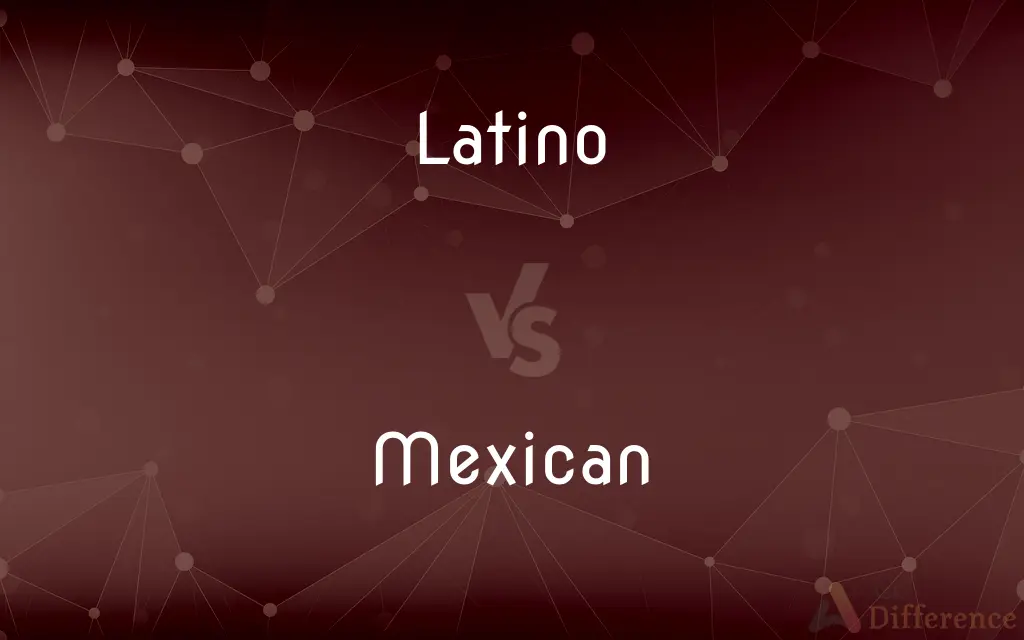Latino vs. Mexican — What's the Difference?
By Tayyaba Rehman — Published on October 27, 2023
Latino" refers to people from, or descendants of, Latin American countries. "Mexican" specifically refers to people from Mexico. One is a broad term encompassing many nationalities; the other is nationality-specific.

Difference Between Latino and Mexican
Table of Contents
ADVERTISEMENT
Key Differences
Latino" is a term used to describe people who originate from or have ancestry from Latin America, covering a broad range of countries in Central and South America, and the Caribbean. This word encompasses people from different nationalities, cultures, and ethnicities, who may share some common cultural elements but also have their unique traditions and backgrounds.
On the other hand, "Mexican" is specific to individuals who are from Mexico or have Mexican ancestry. Mexico has its own rich traditions, customs, and cuisine, distinguished from other Latin American countries. While Mexicans are Latinos, not all Latinos are Mexican, as Latino includes people from numerous other countries.
Understanding the distinction between "Latino" and "Mexican" is crucial to appreciate the diversity within the Latino community. While there might be shared cultural traits and a common language among many Latino countries, each country and, indeed, regions within those countries, have their unique attributes and traditions.
Using "Latino" as a blanket term to describe all people from Latin America can often overlook the rich diversity and the unique cultural identities of people from individual countries. Similarly, labeling all Latinos as "Mexican" due to a lack of understanding or awareness can be offensive and reductive, disregarding the distinctiveness of each Latin American country's culture, history, and people.
Comparison Chart
Scope
A broad term for people from any Latin American country.
Specific to individuals from Mexico.
ADVERTISEMENT
Nationalities Included
Encompasses many, e.g., Brazilians, Colombians, Argentinians.
Only includes people from Mexico.
Cultural Diversity
Represents a wide range of diverse cultures and traditions.
Represents the specific culture and traditions of Mexico.
Language
Spanish is common, but Portuguese is also included (Brazil).
Primarily Spanish.
Geographic Origin
Central and South America, and the Caribbean.
Specifically, Mexico.
Compare with Definitions
Latino
Encompassing people from Spanish or Portuguese-speaking countries in the Americas.
Whether from Brazil or Argentina, a person could be described as Latino.
Mexican
A person born in or with ancestry from Mexico.
Carlos is Mexican, his family originates from Guadalajara.
Latino
Reflective of the diverse cultures and traditions of Latin American countries.
Latino music genres are extensive, representing the region's multicultural heritage.
Mexican
Related to the culture, traditions, or language of Mexico.
Mexican cuisine, known for its flavors and spices, is loved worldwide.
Latino
A person from or with ancestry in Latin America.
Roberto, being from Colombia, identifies as a Latino.
Mexican
Descriptive of the unique attributes and characteristics of Mexico and its people.
Mexican folk art is vibrant and symbolic, reflecting the country’s diverse heritage.
Latino
Pertaining to the culture, people, or languages of Latin America.
Latino cuisine is appreciated for its varied and rich flavors.
Mexican
Reflecting the historical and societal developments of Mexico.
Mexican history is rich, marked by ancient civilizations and colonial influences.
Latino
A member of one of the Spanish-speaking peoples of the Americas.
Mexican
Relating to Mexico or its people
Authentic Mexican cuisine
Latino
A descendant of any of these peoples, especially when living in the United States. See Usage Note at Hispanic.
Mexican
A native or inhabitant of Mexico, or a person of Mexican descent
Urban scenes depicting the daily life of Mexicans
Latino
Alternative case form of Latino
Mexican
A native or inhabitant of Mexico.
Latino
An American whose first language is Spanish
Mexican
A person of Mexican ancestry.
Latino
An artificial language based on words common to the Romance languages
Mexican
Of or relating to Mexico or its people, language, or culture.
Latino
Related to or derived from the people or culture of Spain;
The Hispanic population of California is growing rapidly
Mexican
Of or pertaining to Mexico or its people.
Latino
Inclusive of various nationalities sharing some common cultural or linguistic ties.
Despite their different nationalities, Latinos often share a bond through language and culture.
Mexican
A native of inhabitant of Mexico
Mexican
Of or relating to Mexico or its inhabitants;
Mexican food is hot
Mexican
Pertaining to the geographic and demographic context of Mexico.
The Mexican landscape is varied, featuring mountains, beaches, and deserts.
Common Curiosities
Is "Mexican" a synonym for "Latino"?
No, "Mexican" specifically refers to people from Mexico, while "Latino" is a broader term.
What does "Latino" refer to?
"Latino" refers to people with origins or ancestry from Latin American countries.
Can a person be both Latino and Mexican?
Yes, Mexicans are Latinos, but not all Latinos are Mexican.
Can Brazilians be considered Latinos?
Yes, Brazilians are considered Latinos as Brazil is a part of Latin America.
Is every Latino person Mexican?
No, Latino includes people from various Latin American countries, not just Mexico.
Share Your Discovery

Previous Comparison
Fundamental Rights vs. Directive Principles
Next Comparison
DDR3 vs. DDR4Author Spotlight
Written by
Tayyaba RehmanTayyaba Rehman is a distinguished writer, currently serving as a primary contributor to askdifference.com. As a researcher in semantics and etymology, Tayyaba's passion for the complexity of languages and their distinctions has found a perfect home on the platform. Tayyaba delves into the intricacies of language, distinguishing between commonly confused words and phrases, thereby providing clarity for readers worldwide.















































